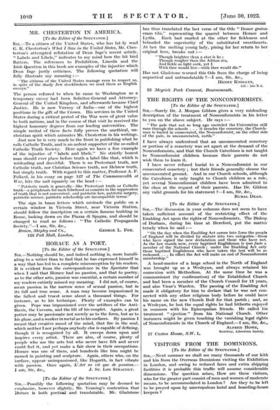[To the Editor of the SPECTATOR.] SIR,—The 'discussion in your
columns does not seem to have taken sufficient account of the restricting effect of the Enabling Act upon the rights of Nonconformists. The Bishop of Durham, during his time at Hereford, put the matter tersely when he said :— " On the day when the Enabling Act comes into force the people of England will be divided by statute into two categories—those who have signed the new declaration and those who have not. As the law stands now, every baptized Englishnian is ipso facto a member of the National Church ; under the Enabling Act only those baptized Englishmen who have taken the test will be so reckoned. . . . In effect the Act will make an end of Nonconformist membership."
A head-master of a large school in the North of England was brought up as a Wesleyan, and always retained his
connexion with Methodism. At the same time he was a communicant (by confirmation) of the Established Church and had been a member of the Church Council for 15 years, and also Vicar's Warden. The passing of the Enabling Act made it obligatory for him to declare that he was not con- nected with any other religious body before he could have his name on the new Church Roll for that parish ; and, as a Wesleyan, he lost the equal rights he had hitherto enjoyed in common with his Episcopalian friends. He called his treatment " ejection " from his National Church. Other instances might be given touching the vanishing legal rights of Nonconformists in the Church of England.—I am, Sir, &c.,
ALFRED HOWE, Secretary, Liberation Society.
17 Caxton House, S.W. 1.










































 Previous page
Previous page